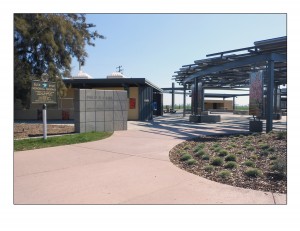
As part of its effort to reduce greenhouse gas emissions and save taxpayer money, Caltrans announced that the Philip S. Raine Roadside Rest Area on SR 99 in Tulare County has received the Leadership in Energy and Environmental Design (LEED) Platinum certification, the highest possible environmental rating by the United State Green Building Council (USGBC).
“This platinum certification represents the deep commitment of Caltrans to delivering not only safety and mobility, but also sustainability in California’s transportation system,” said California State Transportation Agency Secretary Brian Kelly.
The Raine facility near Tipton, one of 233 buildings in California to achieve this milestone, serves more than four million visitors annually. Caltrans has previously earned LEED Gold certification for its Los Angeles office and LEED Silver certification for the district office in Marysville.
Caltrans replaced the rest area’s landscaping with drought tolerant and native plants, which, along with improved irrigation, will save an estimated 12 million gallons of water annually that can be put to good use by Central Valley farmers. During construction, Caltrans sent all construction waste to recyclers instead of the landfill and incorporated regional materials from within 500 miles of the project.
The following upgrades transformed the Raine facility into an energy-efficient rest area that will save taxpayer money and better serve travelers:
- High-efficiency lighting, heating, ventilation and air-conditioning units;
- Natural day lighting of interior spaces;
- A shade canopy with photovoltaic panels;
- Healthy indoor air quality by eliminating dust, moisture and contaminants from interior spaces.
USGBC is recognized as the country’s leading authority on green building standards.
The Raine rest area was originally constructed in 1965, with upgrades added in 1984. The improved facility reopened in November 2012, after completing an $8.5 million rehabilitation that included environmental upgrades and compliance with the American Disabilities Act.
